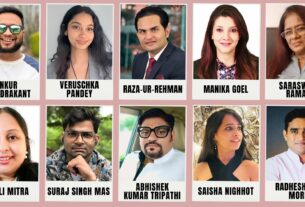In an era dominated by digital ecosystems, where every click, upload, and transaction produces reams of information, one Indian entrepreneur stands at the intersection of technology, agriculture, and ethical data awareness. Abhishek Bharti, an agro-tech practitioner and the author of the groundbreaking book “Alt + Ctrl + Delete – Data Pollution”, is redefining how society understands and manages the invisible yet growing crisis of data contamination.
Recognized for blending deep technical expertise with genuine environmental and social conscience, Abhishek has emerged as a leading voice in the growing global discourse around data governance and sustainability. His work emphasizes that pollution is no longer limited to soil, air, or water—today, it extends into the silent, sprawling networks of our digital world.
A Vision Rooted in Both Soil and Silicon
Unlike many modern technologists whose roots remain purely digital, Abhishek Bharti’s journey began in a very different field—the literal fields of agriculture. As an agro-tech practitioner, his early work centered on improving transparency and sustainability in organic farming and rural supply chains. Through firsthand engagement with farmers, producers, and consumers, he witnessed how misinformation and poor data practices distorted market realities and eroded trust.
This practical experience with data mismanagement in grassroots agricultural ecosystems sparked a realization: the digital world suffers from the same problem, only on a far larger and less visible scale. Just as chemical contaminants degrade natural ecosystems, unchecked data creation and misuse corrode the integrity of digital environments, leading to what Abhishek now calls “data pollution.”
What Is Data Pollution?
At its core, data pollution refers to the accumulation, misuse, or distortion of information that reduces clarity, accuracy, and value across systems. Much like environmental waste, polluted data leads to harmful consequences—inefficient decision-making, misinformation, algorithmic bias, and privacy erosion.
In his book, “Alt + Ctrl + Delete – Data Pollution”, Abhishek Bharti unpacks this concept with insight and urgency. He argues that data pollution emerges from the modern obsession with quantity over quality—where organizations collect limitless information without adequate validation, filtration, or ethical consideration.
According to Abhishek, every inaccurate entry, duplicated record, or manipulated dataset adds to a growing layer of digital waste, one that clouds understanding and undermines trust in information-driven societies. This parallel between environmental and data pollution runs throughout his work, giving readers a clear lens through which to grasp a complex and often overlooked global challenge.
The Message Behind Alt + Ctrl + Delete
The book’s title serves as both metaphor and call to action. Alt + Ctrl + Delete, a familiar command for resetting a computer, becomes symbolic of humanity’s need to reset its relationship with data. Abhishek urges policymakers, technologists, and everyday users to take control of the digital processes that shape our world—alternative paths (Alt), control mechanisms (Ctrl), and corrective action (Delete).
Across its chapters, the book examines how data pollution manifests in industries, government systems, social media platforms, and e-commerce environments. Abhishek outlines preventive measures that can restore digital ecosystems, such as establishing data responsibility frameworks, adopting ethical AI practices, and promoting data quality literacy at the community level.
The tone of the book is not alarmist but enlightening. It balances authority with accessibility, offering a rare perspective that bridges both technological comprehension and human impact. For Abhishek, data pollution is not just a systemic or corporate issue—it is a civic one that affects everyone who interacts with technology, from farmers to consumers to digital citizens.
From Organic Fields to Digital Ethics
Abhishek’s dual background in agriculture and software development gives his message unusual depth. As the CEO and founder https://oqart.com/ , India’s first trusted organic e-commerce marketplace, he has built platforms that directly connect certified organic farmers and producers to conscious consumers. Through Oqart, he champions purity and fairness in both the physical and digital value chains.
This entrepreneurial experience shaped his belief that authenticity—whether in data or food—is the foundation of trust. The same principles that govern organic certification apply, in Abhishek’s view, to information integrity: traceability, transparency, and accountability.
In interviews and talks, he often notes that just as pesticide residues contaminate crops invisibly, poorly validated data contaminates organizations from within. Both forms of pollution disrupt ecosystems that rely on trust, sustainability, and shared responsibility. By linking agriculture to data governance, Abhishek Bharti demonstrates how ancient wisdom and modern science can work together for a cleaner, more ethical digital future.

The Growing Relevance of Data Pollution
The timing of Abhishek’s message could not be more significant. With billions of devices connected through the Internet of Things (IoT), artificial intelligence systems consuming massive data inputs, and social networks driving opinions globally, the purity of data has become as critical as the purity of natural resources.
Organizations increasingly realize that unreliable or manipulated data leads to costly decisions and loss of credibility. Governments too face the challenge of tackling misinformation amid a flood of unverified content. Abhishek’s framework for addressing data pollution resonates strongly with these realities, positioning him at the heart of a movement toward digital accountability.
He warns that while data has been called the “new oil,” it also carries the same risks—overexploitation, contamination, and unequal distribution of power. His book and advocacy encourage society to handle data with the same respect and caution demanded by environmental sustainability.
Advocacy, Awareness, and the Path Ahead
Beyond writing, Abhishek actively promotes awareness about data pollution through seminars, digital literacy programs, and collaborations with educational institutions. He believes that the solution begins with awareness—helping individuals recognize the role they play as both producers and consumers of data.
His outreach programs draw parallels between familiar sustainability concepts like “reduce, reuse, recycle” and data use behaviors in the digital world. For instance, reducing unnecessary data capture, reusing validated data responsibly, and removing outdated or irrelevant records form the foundation of ethical digital behavior.
Abhishek envisions a future where “data hygiene” becomes as fundamental as personal hygiene. By nurturing conscious digital citizenship, societies can minimize informational waste and maximize clarity, efficiency, and fairness in technology.
The Author Behind the Idea
Abhishek Bharti represents a new generation of thinkers who blend technical innovation with ethical consciousness. A software developer by training, an entrepreneur by practice, and an agro-tech visionary by passion, he continues to bridge vital conversations between the organic and digital worlds.
His professional work through Oqart.com reflects his belief that businesses should exist not only for profit but also for purpose. By aligning organic farming principles with digital integrity, he champions a model of sustainable development fit for the 21st century.
With Alt + Ctrl + Delete – Data Pollution, Abhishek does more than expose a global issue; he offers a blueprint for action, calling each reader to become a steward of clean data. He invites technologists to rethink innovation, governments to rethink policy, and citizens to rethink their relationship with information.
Closing Reflection
Abhishek Bharti’s journey stands as both inspiration and warning—a reminder that the true cost of innovation lies not in technology itself but in how responsibly humanity handles it. Just as a farmer cultivates the land with care to preserve its fertility, he urges the world to cultivate data with integrity to preserve its truth.
Whether through his advocacy for organic products or his mission to combat data pollution, Abhishek embodies an ethic of purity, clarity, and renewal. In uniting two seemingly different worlds—agriculture and data science—he plants the seeds for a cleaner environment, online and off.



